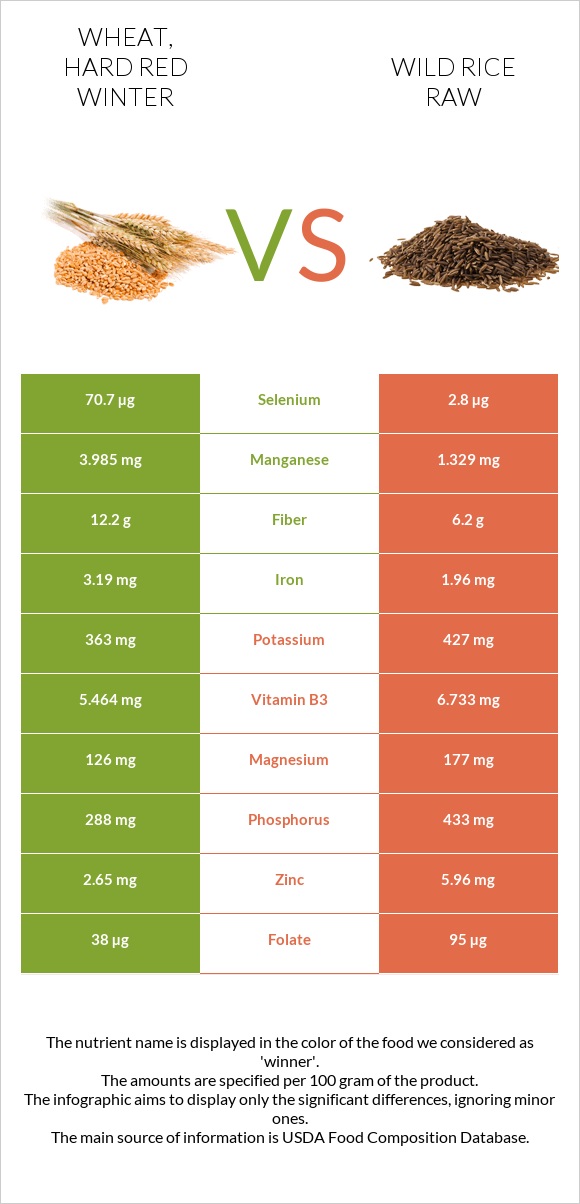Wheat, hard red winter vs. Wild rice raw — In-Depth Nutrition Comparison
Compare
Significant differences between wheat, hard red winter and wild rice raw
- Wheat, hard red winter has more selenium, manganese, fiber, vitamin B1, and iron; however, wild rice raw is richer in zinc, phosphorus, folate, magnesium, and vitamin B2.
- Wheat, hard red winter covers your daily selenium needs 123% more than wild rice raw.
- Wild rice raw has 3 times less vitamin B1 than wheat, hard red winter. Wheat, hard red winter has 0.383mg of vitamin B1, while wild rice raw has 0.115mg.
Specific food types used in this comparison are Wheat, hard red winter and Wild rice, raw.
Infographic

Infographic link
Mineral Comparison
Mineral comparison score is based on the number of minerals by which one or the other food is richer. The "coverage" charts below show how much of the daily needs can be covered by 300 grams of the food.
| Contains more CalciumCalcium | +38.1% |
| Contains more IronIron | +62.8% |
| Contains less SodiumSodium | -71.4% |
| Contains more ManganeseManganese | +199.8% |
| Contains more SeleniumSelenium | +2425% |
| Contains more MagnesiumMagnesium | +40.5% |
| Contains more PotassiumPotassium | +17.6% |
| Contains more CopperCopper | +20.7% |
| Contains more ZincZinc | +124.9% |
| Contains more PhosphorusPhosphorus | +50.3% |
Vitamin Comparison
Vitamin comparison score is based on the number of vitamins by which one or the other food is richer. The "coverage" charts below show how much of the daily needs can be covered by 300 grams of the food.
| Contains more Vitamin EVitamin E | +23.2% |
| Contains more Vitamin B1Vitamin B1 | +233% |
| Contains more Vitamin AVitamin A | +∞% |
| Contains more Vitamin B2Vitamin B2 | +127.8% |
| Contains more Vitamin B3Vitamin B3 | +23.2% |
| Contains more Vitamin B5Vitamin B5 | +12.6% |
| Contains more Vitamin B6Vitamin B6 | +30.3% |
| Contains more FolateFolate | +150% |
All nutrients comparison - raw data values
| Nutrient |  |
 |
DV% diff. |
| Selenium | 70.7µg | 2.8µg | 123% |
| Manganese | 3.985mg | 1.329mg | 115% |
| Zinc | 2.65mg | 5.96mg | 30% |
| Fiber | 12.2g | 6.2g | 24% |
| Vitamin B1 | 0.383mg | 0.115mg | 22% |
| Phosphorus | 288mg | 433mg | 21% |
| Iron | 3.19mg | 1.96mg | 15% |
| Folate | 38µg | 95µg | 14% |
| Magnesium | 126mg | 177mg | 12% |
| Vitamin B2 | 0.115mg | 0.262mg | 11% |
| Copper | 0.434mg | 0.524mg | 10% |
| Vitamin B3 | 5.464mg | 6.733mg | 8% |
| Vitamin B6 | 0.3mg | 0.391mg | 7% |
| Protein | 12.61g | 14.73g | 4% |
| Calories | 327kcal | 357kcal | 2% |
| Potassium | 363mg | 427mg | 2% |
| Vitamin B5 | 0.954mg | 1.074mg | 2% |
| Fats | 1.54g | 1.08g | 1% |
| Carbs | 71.18g | 74.9g | 1% |
| Calcium | 29mg | 21mg | 1% |
| Vitamin E | 1.01mg | 0.82mg | 1% |
| Choline | 31.2mg | 35mg | 1% |
| Saturated fat | 0.269g | 0.156g | 1% |
| Protein per 100 calories | 3.856269113149847g | 4.126050420168068g | N/A |
| Calories per 10 g protein | 259.31800158604284kcal | 242.36252545824846kcal | N/A |
| Net carbs | 58.98g | 68.7g | N/A |
| Sugar | 0.41g | 2.5g | N/A |
| Sodium | 2mg | 7mg | 0% |
| Vitamin A | 0µg | 1µg | 0% |
| Vitamin K | 1.9µg | 1.9µg | 0% |
| Monounsaturated fat | 0.2g | 0.159g | 0% |
| Polyunsaturated fat | 0.627g | 0.676g | 0% |
| Tryptophan | 0.16mg | 0.179mg | 0% |
| Threonine | 0.365mg | 0.469mg | 0% |
| Isoleucine | 0.458mg | 0.618mg | 0% |
| Leucine | 0.854mg | 1.018mg | 0% |
| Lysine | 0.335mg | 0.629mg | 0% |
| Methionine | 0.201mg | 0.438mg | 0% |
| Phenylalanine | 0.592mg | 0.721mg | 0% |
| Valine | 0.556mg | 0.858mg | 0% |
| Histidine | 0.285mg | 0.384mg | 0% |
Macronutrient Comparison
Macronutrient breakdown side-by-side comparison
Protein:
12.61 g
Fats:
1.54 g
Carbs:
71.18 g
Water:
13.1 g
Other:
1.57 g
Protein:
14.73 g
Fats:
1.08 g
Carbs:
74.9 g
Water:
7.76 g
Other:
1.53 g
| Contains more FatsFats | +42.6% |
| Contains more WaterWater | +68.8% |
| Contains more ProteinProtein | +16.8% |
~equal in
Carbs
~74.9g
~equal in
Other
~1.53g
Fat Type Comparison
Fat type breakdown side-by-side comparison
Saturated fat:
Sat. Fat
0.269 g
Monounsaturated fat:
Mono. Fat
0.2 g
Polyunsaturated fat:
Poly. Fat
0.627 g
Saturated fat:
Sat. Fat
0.156 g
Monounsaturated fat:
Mono. Fat
0.159 g
Polyunsaturated fat:
Poly. Fat
0.676 g
| Contains more Mono. FatMonounsaturated fat | +25.8% |
| Contains less Sat. FatSaturated fat | -42% |
~equal in
Polyunsaturated fat
~0.676g